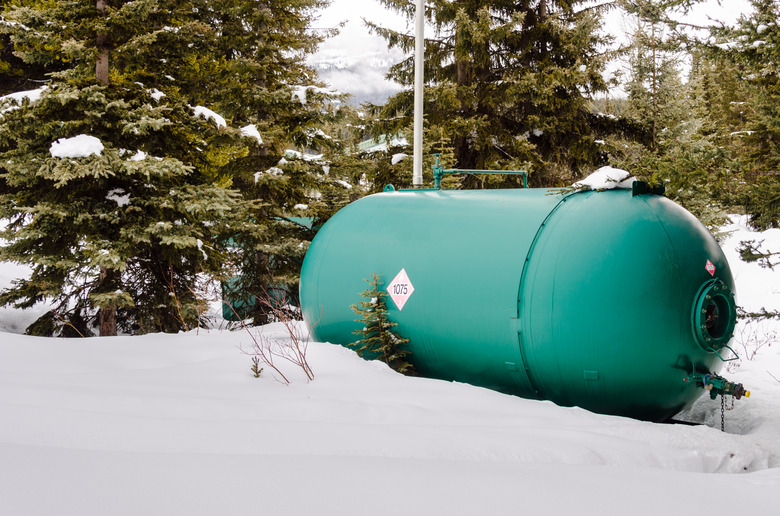Why Does A Propane Tank Knock Or Ping?
We may receive a commission on purchases made from links.
There's no doubt anyone touring rural areas who has spent a lifetime as a city dweller has wondered about those huge white cylindrical tanks that sit on just about every property around the countryside. They are curious-looking, and because they contain — at very high pressure — the fuel source that powers their lives, it's important for those who live with them to deal with them safely. If knocks and pings are heard coming from inside a propane tank, it's good to know what it means.
Tip
A knocking or pinging sound coming from a propane tank indicates an imbalance of air and gas, a serious situation that should be corrected immediately by a professional technician.
About Propane Tanks
About Propane Tanks
Propane, often referred to as "bottled gas," is a safe, clean-burning energy source — a colorless, odorless fossil fuel stored as a liquid in pressurized tanks. Lots of people use propane canisters for their gas grills, but in rural areas where there's no natural gas service, propane is used for such appliances as furnaces, space heaters, ovens, ranges, air conditioners, water heaters and clothes dryers. The tanks, which are manufactured in many shapes and sizes, store the propane in liquid form at high pressure, and they are filled on-site by technicians trained in the safe handling of the gas.
What Causes Knocks and Pings?
What Causes Knocks and Pings?
If you hear a knocking sound or a ping coming from a propane tank, there's most likely an imbalance of air and gas within the unit. Checking your flames can help verify this sort of unevenness. Normally, you'll see a blue flame with a yellow tip, but an imbalance will be indicated by a white flame or a yellow flame.
Such an imbalance could be dangerous and should be addressed as soon as possible, so call your supplier immediately to request help from a trained technician who will be able to adjust the tank's airflow.
Other Sounds You May Hear
Other Sounds You May Hear
Gurgling and humming noises that you hear after turning on your gas can point to an overfilled tank, which results in too much pressure on the regulator and reduced outflow. This can be evidenced by low heat, off-color pilot lights and a flame that's lower than normal. If this happens, do not attempt to drain the tank yourself. This is a job for your supplier.
Humming can also occur as a result of air becoming trapped in the hose or vibration of the regulator's rubber diaphragm.
The most common sound associated with propane tanks is hissing, which signals a gas leak. This is different from the rushing sound you hear as you turn on your gas line, and it requires immediate attention. When you hear hissing, turn off your tank and any appliances that use propane and then promptly call your propane supplier for assistance.
Even though propane itself has no odor, propane companies add a chemical called mercaptan to propane to lend to the gas what is usually referred to as a "rotten egg smell" that helps in the detection of leaks. The presence of this odor along with a hissing sound can be further indication of a leak.
